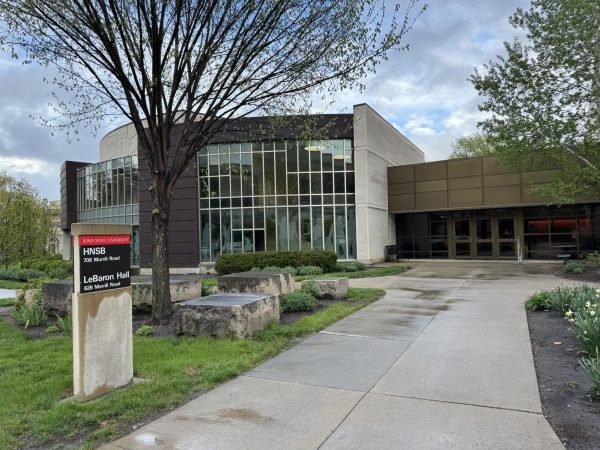ISU rejects exclusive Coke contract
May 22, 2001
Coca-Cola proposed a contract that would give the company exclusive selling rights on campus as well as several other perks, but the proposed profits simply weren’t great enough for the university to sign, ISU officials said.
Proposals within the contract included having Beardshear Hall’s pillars clad in Coca-Cola ribbons on vending machines and the words “Coca-Cola” on scoreboards, as well as football skyboxes and courtside seats at basketball games reserved for Coke employees.
These advertisement opportunities and corporate perks were merely suggestions made by the beverage company, not mandatory terms of the proposed contract between Iowa State and Coca-Cola that was recently nixed, said Warren Madden, vice president of Business and Finance.
Iowa State currently has four mini-contracts with Coca-Cola, he said.
The Athletic Department is under one of these contracts with Coke until 2004. Madden said Coke already receives perks such as skyboxes at football games and basketball courtside seats and no perks of that nature would have been added if the larger contract had been signed.
He also said if the contract would have passed, the advertising scheme offered by Coca-Cola would not have.
“I am concerned about basic levels of commercialization,” Madden said.
He said that the advertising at Jack Trice Stadium and Hilton Coliseum is normal for Big Ten and Big 12 schools, and that most people would find ads on scoreboards acceptable, but he was still not in favor of Coke’s suggestions for promotions.
A substantial amount of advertising revenue goes to support student activities, he said.
Iowa State spent $26,000 to hire an outside consultant, Convention Sports and Leisure of Minneapolis, to calculate how much the Coke deal would benefit the university.
Madden said the fee paid to the consultant was not money wasted, as critics suggest, but was necessary to compare several phases of the researching process. This was a process campus experts simply did not have time to accomplish while performing their usual university duties, Madden said.
“We have a very proficient procurement staff here,” he said. “This was a timeline-workload issue.”
Qualified staff members were asked if such a time-consuming process was feasible while completing their regular jobs on campus. Madden said it wasn’t possible for the faculty members to redirect enough time to get quality results.
“We didn’t have any faculty members volunteer their time to take on this research, including Mr. Fletcher,” Madden said.
Lehman Fletcher, professor of economics, was a strong opponent of hiring an outside consultant and of the beverage contract itself from its beginning stages in 1999.
He was a member of an ISU committee comprised of 19 representatives of the university, including staff and students.
“In terms of the contract, I was opposed because I felt it was contrary to the educational and ethical values of the university,” he said.
Fletcher also said he thought the particular consultant chosen was biased toward monopolies by beverage companies.
Fletcher acknowledged that other committee members didn’t share his views.
Arlo Meyer, director of business affairs for purchasing, was also a member of the committee. Meyer said he would have agreed to the contract if it would have increased the university’s revenue greatly and if “a substantial amount of its revenue would have gone to fund the student groups who would have been giving up their choice [of beverage].”
He said the studies showed that under the Coca-Cola contract, residence halls would have been hit with elevated soft drink prices in their convenience stores, lower commissions would be garnered from vending machines, and the Athletic Department would have had to pay more in order to provide the drinks served to Cyclone fans and athletes.
Program director for the Athletic Department Laurie Gustafson confirmed that the “all-university contract was not in the best interest of the Athletic Department.”
Iowa State would have reaped benefits of approximately $100,000 to $150,000 per year, Meyer said.
“We decided it wasn’t enough revenue to take away the choice,” he said.
Madden said Iowa State may look into smaller mini-contracts with other bottling companies such as American Bottling, which bottles Dr. Pepper, in the future.
















